|
For the second year, we are pleased to present our flashglass anthology - a collection of all flash works originally published online at rowanglassworks.org in 2016. The anthology is available for online viewing, digital download, and for purchase in print. We will also have copies available at the annual AWP Conference in Washington DC this February!
Thanks to all our contributors for allowing us to present their work this year!
0 Comments
 A man broke into the cigarette-smelling, moldy room of the halfway house on Western Avenue in Hollywood in 1972. My grandfather lay on the bed, with his one leg, his dark-dyed hair, his fine-cut houndstooth jacket, his stained wool pants, passed out, an empty bottle of brandy lying on the wooden floor. His paintings were stacked in the corner, beside a cigar box overflowing with gold chains, pins, diamond cufflinks. These were the only things my grandfather had left. The man, after glancing around the room, lifted a wooden chair and brought it down on my grandfather’s head. The man didn’t need to do that that little bit of violence, but I imagine that he wanted to make sure the stinking lout was dead. Then he gathered up the paintings, the jewelry, and cut out of there, into the dizzyingly bright sunlight. At a pawn shop down the street, he translated the booty into cash. And that was that. The police report later said it had been blunt force trauma, with a motive of robbery, that killed my grandfather. But it could just as well have said Nazis, or the Holocaust, or alcohol, or terror, or malnutrition, or loss of his family, or confusion, or the many other undiagnosable ills and accumulated plagues of a life. But maybe the police report summed it up as well as it could be summed up, after all. Blunt force trauma. “He was always a ladies’ man,” my great-aunt Irene, his little sister, told me once when I visited her. She wore a flowing, flowery dress, heavy European perfume, and bright red lipstick, and she talked in a thick Hungarian accent. “He’d keep the phone on the piano day or night, in Budapest, waiting for the calls.” That was before the war, before he went into hiding, before the family lost the deli and the house, before they went to displaced persons’ camps, before they crossed the Atlantic, before Alabama, before California, before the divorce, before the gangrene, before the halfway house. This, then, is how it ends. This is the final stop. In Hollywood, in a small, urine-soaked room, on a hot summer day, the sun rising to a crescendo over the smoggy city, the limitless future stretching ahead like a glistening freeway.
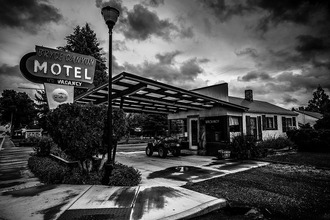 Most girls trick and dream. While they swap wigs and pumps, trade skirts. They smoke cigarettes and pipe-dream nights free from the motel. Most men walk around like Chivalry is dead and they’re the ones who shot him. But one of these days, they are sure, a man, white knight or cowboy, will arrive on a big Bay horse. His pale suit shining. The other girls hope but January knows better. Knew better the day her daddy sat her down just to split the world in two. You either baiting the hook, January, he said, or you biting one. Simple as that. And he showed her just how simple the day he sucked the yellow off a pack of Lemonheads and sold them to the dope fiends on the corner. Dipped them in scale first just to get their lips numb. Bait and switch, he called it, Gets ‘em everytime. When she asked him why they always took the bait, he told her Half the world is dying to bite the hook, the other half drags the line. So let the other girls dream. Motel life is a way station between nothing and not much, between the blade and brass pole. Any which way you turn is skin trade, so why not make the best of bad, rent a room. At least you’ll save your feet. The thing January hates most is the tricks. They don’t know if they want to fight, fuck, or cry half the time, and it doesn’t matter which one he is, knight or cowboy, either way he’s breaking horses. The thing she likes most is maid service. How she can leave the room devastated, a tempest of bed sheets and towels, tiny liquor bottles, and the walls are sweating. Knowing it will all be cleaned, washed away when she returns. It is a glory all her own, a faith held close to the chest. Maids are the patron saints of motel life. And the rooms are lives you are reborn into every day.
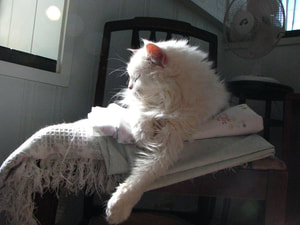 In the absence of cats, first, check the windows and door to the fire escape. Chant Simone, Jean-Paul, Simone, Jean-Paul, while flinging open the bedroom closet and shoving aside kitchen chairs. Try to think what he would do in the absence of cats. Pry lids from cans of tuna. Roll a ball of yarn in front of the TV. In the sudden, inexplicable absence of cat toys, shake a box of wooden matches. Pace the kitchen’s chipped tile while your armpits dampen. Unbutton your white coat. Flatten your body against the carpet and burrow halfway under the bed. Press speed dial 4, stop, then say, “F it,” and hit the call button; when it goes straight to his voicemail (wtf?), leave a frenzied, rambling message about the absence of cats. In the absence of cats, try to remember the last time you noticed their presence: last night—no, this morning—lounging on your pathology text while he sermonized about the superiority of Canadian universal healthcare. Shove the book from the futon. Obviously, no cats. Feel your chest tighten in the absence of cats. Rub your fingers together, say, Here, kitty, kitty, kitty, and other generic things you imagine people say when faced with the absence of cats. Dial his number again. Try their names again. Begin to notice the absence of other things: the wireless printer, the framed Matisse, two entire shelves’ worth of Continental philosophy. The phone hits the carpet. Rush back to the closet. No Converse or cashmere sweater, no sock monkey tie dangling from the shelf. Stagger now, stricken, to the bathroom. The Scope. The beard oil. Half the washcloths. And there, under the window, confirmation of the absence of cats: the absence of their box.
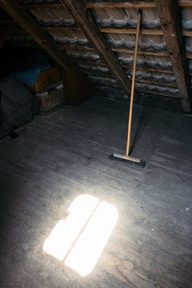 Years ago, I left this house, ran from everything in it, my dad’s last words repeating themselves on a loop in my mind, the funeral over so all I had to do was lock the door to my childhood home and flee, I thought, forever. Though he had left it to me, how could I walk the same halls he and Mom, gone just two years before, had walked since my birth? How could I sit at the same table where the three of us ate together? How could I? How could I? Yesterday, the tenth anniversary of Dad’s death dawned gray in my married home. I looked at my husband, whispered, “I can go back.” He hugged me and said, “Go.” I drove the hundred miles from our small town to the countryside where I grew up, memories making their way back mile by mile. Now in the still house, the creak of the closet door rings and lingers where once language and laughter filled the kitchen. Inside, I dig through musty shirts, jackets, and hats Dad wore over seasons as he chopped wood, trimmed plants, and shoveled snow to keep us connected with friends and neighbors. I search until I find it--the broom. Bringing it out, I gaze back at my path taken today from entryway to closet. Such a long, slow journey to return here, I marvel at the familiar books calling my name and the handsome grandfather clock striking the hour. My steps had left footprints in the settling dust of ten years, so I began to sweep. Broom bristles leave a series of lines and patterns. I sweep again and again to clean every inch. The swishing has a rhythm, and I find myself humming a tune. After what seems but a minute, the dust disappears; no longer do I see my footprints on the floor. I return to the closet, open the door once more. The creak still startles, no longer lingers. Anjali Pursai was accepted into the prestigious workshop devoted to poetry, Poetry Power in the San Francisco Bay Area, taught by an award winning poet. Since that time, she has earned several publications, such as Chautauqua Literary Magazine in New York, and awards, such as the National League of American Pen Women. She has also been invited to read her work aloud at a number of well-known Bay Area locations, such as the Koret Auditorium at the Main Branch of the San Francisco Library. She finds herself more and more enthusiastic about the art of poetry, both writing and reading it aloud or to herself.
The bull always tries, every fight, to find that safe spot in the sand that he believes will provide courage or some kind of dusty comfort when the time comes: the querencia. This place where one can be grateful: at least you’re not a donkey painted to look like a zebra in Tijuana. The bull paws the ground until it looks like that stretch on the sofa where the cloth is crushed, where one always goes to sit down and read a book. Around five o’clock in the afternoon. A light bulb flickers off to the side, a flash of sequins, almost. But it’s not enough to get up for and fix, not yet. One more moment, please. Because, for a moment, in this fine blank space, triumph seems possible—it’s happened before (bulls have been pardoned for their bravery; bulls have killed the matador). And it’s happened more than once. So maybe. But then something else appears, occurs, and one is forced out, all of sudden, to another place in the world, like leaving Arles for Seville, even though the sand is similar all over the ring: we know this. And so does the bull: you can’t fool him.  Tara Deal is the author of That Night Alive: I’ve Come Close (forthcoming, winner of the 2016 novella prize from Miami University Press) and Palms Are Not Trees After All (winner of the 2007 novella prize from Texas Review Press). Her work has also appeared in Alimentum, failbetter, and West Branch, among others. She lives in New York City. Why not red? To match her little leather book embossed with a dappled kestrel? To match the wilted poppy twisted in her deep blue hair? She has seen the piles of dolls crowded in roped-together boats, drifting listlessly, seasick and heartsick, anxious as cats. They bleed because now they have blood. The wind eats their foreheads and painted pink smiles. They are the opposite of pure. Salt in their eyes makes them suffer. Their bright kimonos, many-layered, pinch and steal their breath. When they can’t stand the smell, they cast their peach blossoms and rice cakes into the sea. Who would want these dolls now?They are still too precious to touch. The weight of any shoe fits the mermaid’s palm like a clam. Rows of black silk slippers gaze at her like otter eyes.  Kathleen McGookey’s most recent book is Stay (Press 53). Her book Heart in a Jar is forthcoming from White Pine Press in Spring 2017. Her work has appeared in journals including Crazyhorse, Denver Quarterly, Epoch, Field, Ploughshares, Prairie Schooner, and Quarterly West. She has received grants from the French Ministry of Foreign Affairs and the Sustainable Arts Foundation. 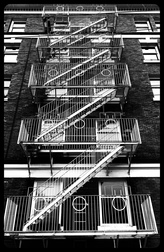 I rented an apartment above the bank downtown, where, straight out of the 40’s, an army of women staffed the gleaming counter, dabbing their lips and patting their hair. The children’s footsteps echoed through the light and airy halls. I don’t think we’re any safer here, my husband whispered, eyeing the crumbling black and white tiles, the slow flies buzzing in the windows. Winter was coming. The police would come faster if we lived above a vault. Later, when fall colors were at their finest, we could hold dinner parties at the country house. Now, on our first night, we searched for the hidden staircase to our new quarters. We each held a twin’s hand, but when the baby wailed, we saw yellow jackets crawling all over her teeth and tongue.  Kathleen McGookey’s most recent book is Stay (Press 53). Her book Heart in a Jar is forthcoming from White Pine Press in Spring 2017. Her work has appeared in journals including Crazyhorse, Denver Quarterly, Epoch, Field, Ploughshares, Prairie Schooner, and Quarterly West. She has received grants from the French Ministry of Foreign Affairs and the Sustainable Arts Foundation.  My kitchen clock stopped where I like it, 11:37, morning just blooming into afternoon. My desk clock froze at 10:10—plenty of time to work before lunch. Between kitchen and desk an hour opens: bees disappear into my hydrangeas, a thrush calls from the field, and my creek and the traffic beyond it warble and hiss, braid themselves into a white rush that settles around me. I have clocks of wasps and swans, of hammers and sand, of bridges over mist and the boat-shaped leaves that drift below. My doctor’s appointments never arrive on my clocks of teeth and dice, of napping cats, of thick erasers and combs. The children are always snug at school, learning their times tables and trading pennies for nickels. If I go out, my brother comes and winds my clocks.  Kathleen McGookey’s most recent book is Stay (Press 53). Her book Heart in a Jar is forthcoming from White Pine Press in Spring 2017. Her work has appeared in journals including Crazyhorse, Denver Quarterly, Epoch, Field, Ploughshares, Prairie Schooner, and Quarterly West. She has received grants from the French Ministry of Foreign Affairs and the Sustainable Arts Foundation. 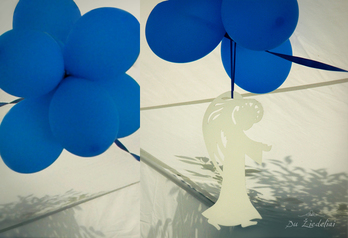 Yesterday, a five-year-old boy drowned in the lake when he was out duck hunting with his dad. I overheard the girls at work talking about the Catholic church, how there’s nice people over there handing out balloons to support the family. When I get off work it’s late and nearly dark but sure enough when I pull into my small town, I see blue balloons tied to lamp-posts, mailboxes, tree branches, decks, and porch lights. It’s gotten cold tonight, it’s made the balloons shrink. They look droopy and saggy; they’re barely hanging on to those pitiful strings. I took care of a kid that choked and died from a balloon once. You better believe there were no balloons at my kid’s birthday parties. There were balloons at my sister’s son’s funeral. I don’t recall balloons at her first son’s funeral, but they were definitely at the second ones. She was in the car at the graveyard, and she wouldn’t get out. She kept crying, “I can’t do this again.” Her husband and some of her friends were gathered around the car. One of the girls had a bundle of blue balloons in one arm and she was hugging my sister with her other arm. Everyone was crying, and I looked over to where all the people were standing by the graves and wondered, “Dear God, why does she have to do this again?” “Can’t we just take her home?” Finally, she got out of that car, leaning on her husband, her friends and the girl carrying the blue balloons. I stood there with my three children, my partner and my ex-husband but I don’t remember what was said. I just stared at those damn balloons. After it was over, my sister’s friend handed out the blue balloons to the children and told them to let them go. The wind didn’t carry them very far. They made a popping sound like gunfire when they struck the tops of the trees inside the cemetery. I looked around, the little kids seemed disappointed, but nobody else showed any emotion. It’s as if we were all so numb and half–dead anyway, we couldn’t get any more deflated. I overheard someone mumble, “It figures.” My sister shrugged her shoulders.
|
FLASH GLASS: A MONTHLY PUBLICATION OF FLASH FICTION, PROSE POETRY, & MICRO ESSAYSCategories
All
Cover Image:
|
|
Glassworks is a publication of Rowan University's Master of Arts in Writing 260 Victoria Street • Glassboro, New Jersey 08028 [email protected] |
All Content on this Site (c) 2024 Glassworks
|

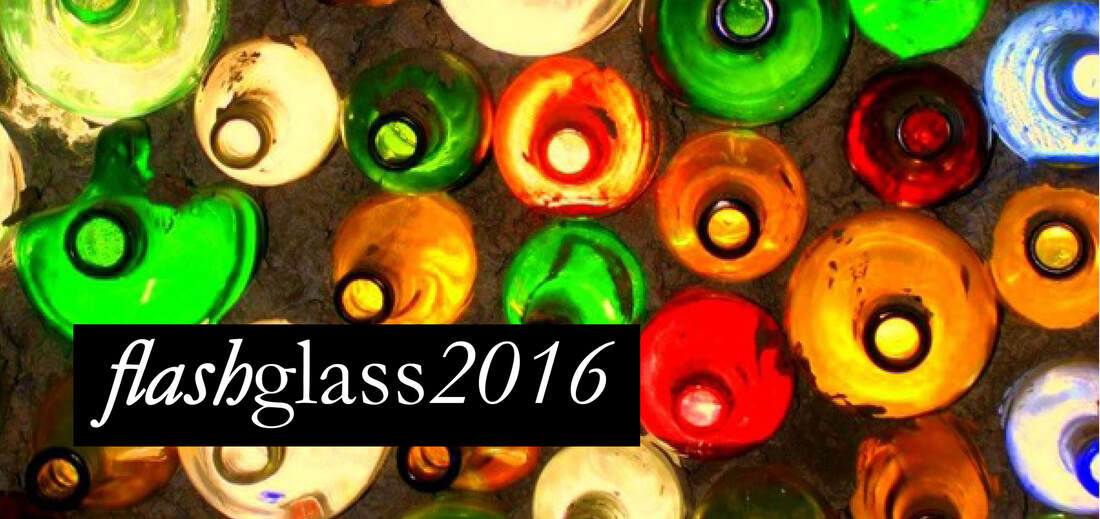





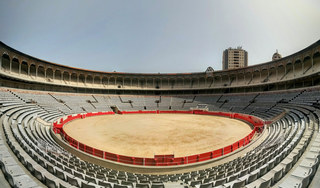
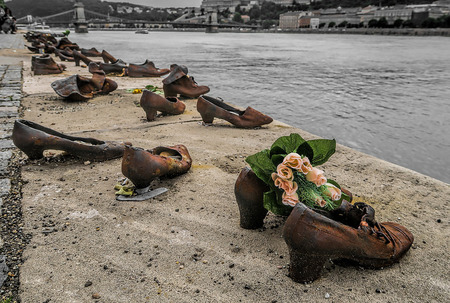

 RSS Feed
RSS Feed
